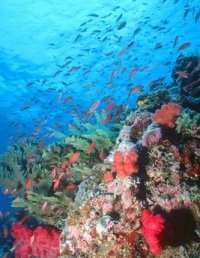Archive for February, 2011

Rotary lights up Camana Bay with key message
 (CNS): The new Ogier Building at Camana Bay joined Italy’s Trevi Fountain, India’s Charminar monument and the New York Stock Exchange last night when it was lit up with a key message by local Rotarians. A message was emblazoning on the building and many others around the world to promote the final push in the goal to eradicate polio from the face of the earth. The "End Polio Now" illumination campaign will last for two weeks and start on Rotary International’s 106th birthday of humanitarian service. “These global illuminations carry Rotary’s pledge to end polio—saying to the world that we will fight this crippling disease to the end,” said Carl-Wilhelm Stenhammar, Chair of The Rotary Foundation. (Photo Dennie WarrenJr)
(CNS): The new Ogier Building at Camana Bay joined Italy’s Trevi Fountain, India’s Charminar monument and the New York Stock Exchange last night when it was lit up with a key message by local Rotarians. A message was emblazoning on the building and many others around the world to promote the final push in the goal to eradicate polio from the face of the earth. The "End Polio Now" illumination campaign will last for two weeks and start on Rotary International’s 106th birthday of humanitarian service. “These global illuminations carry Rotary’s pledge to end polio—saying to the world that we will fight this crippling disease to the end,” said Carl-Wilhelm Stenhammar, Chair of The Rotary Foundation. (Photo Dennie WarrenJr)
“It is our hope that people worldwide will see this visible pledge and join Rotary and its partners in this historic effort to rid the world of polio forever.”
Other iconic landmarks that have carried the pledge in recent years include the Sydney Opera House, London’s Tower Bridge, the Roman Coliseum, Egypt’s Pyramid of Khafre, Chicago’s Wrigley Building, the Obelisk in Argentina and the San Francisco Ferry Building.
Polio eradication has been Rotary’s top priority for more than two decades. The international humanitarian service organization is a spearheading partner in the Global Polio Eradication Initiative, along with the World Health Organization, the U.S. Centers for Disease Control and Prevention, and UNICEF.
Rotary has pledged to raise US$200 million to match $355 million in challenge grants from the Bill & Melinda Gates Foundation. The entire $555 million will be spent in support of eradication activities.
Great progress has been made: The number of cases of polio infection has plunged from about 350,000 in 1988 to fewer than 2,000 in 2009. More than two billion children have been immunized in 122 countries, preventing five million cases of paralysis and 250,000 paediatric deaths.
Rotary club members worldwide have contributed more than $900 million and countless volunteer hours to the effort and are now working aggressively to raise the $200 million needed to match the Gates Foundation grants. The money is needed to ensure that the progress made over more than two decades will continue. To learn more about polio eradication, including how to participate in this historic effort, visit www.rotary.org/endpolio today.
If you would like to make a donation, please visit any of the participating merchants at Camana Bay, approach any local Rotarian, or call the Rotary Sunrise PolioPlus Chair Tony Catalanotto at 926-7368.

Romanians charged over poker card ATM fraud
 (CNS): Two men who were arrested at Owen Roberts International Airport lat week have now been charged with several counts of theft and attempted theft and are due to appear in summary court today. Police from the financial crimes unit arrested the Romanian nationals aged 22 and 25 years charge in connection with a cash machine skimming scam after receiving reports of a number of fraudulent withdrawals from cash machines in the George Town area. The cards used by the suspected fraudsters were not legitimate bank cards but "poker cards" used in casinos and had been seized by the machines.
(CNS): Two men who were arrested at Owen Roberts International Airport lat week have now been charged with several counts of theft and attempted theft and are due to appear in summary court today. Police from the financial crimes unit arrested the Romanian nationals aged 22 and 25 years charge in connection with a cash machine skimming scam after receiving reports of a number of fraudulent withdrawals from cash machines in the George Town area. The cards used by the suspected fraudsters were not legitimate bank cards but "poker cards" used in casinos and had been seized by the machines.
The metallic strips on the cards had been loaded with potential victim’s account details for overseas accounts. The cards had also been used to make purchases at business premises throughout the Island, police added. Following an RCIPS operation on Wednesday, 16 February, with the assistance of the Department of Immigration, the men were arrested at the airport.
Anyone who suspects they may have been a victim of the scam should contact the RCIPS Financial Crime Unit on 949-8797.

Marriage Act blocks gay rights, says Obama
 (New York Times): President Obama, in a striking legal and political shift, has determined that the Defense of Marriage Act — the 1996 law that bars federal recognition of same-sex marriages — is unconstitutional, and has directed the Justice Department to stop defending the law in court, the administration said Wednesday. Attorney General Eric H. Holder Jr. announced the decision in a letter to members of Congress. In it, he said the administration was taking the extraordinary step of refusing to defend the law, despite having done so during Mr. Obama’s first two years in the White House. “The president and I have concluded that classifications based on sexual orientation” should be subjected to a strict legal test intended to block unfair discrimination, Mr. Holder wrote.
(New York Times): President Obama, in a striking legal and political shift, has determined that the Defense of Marriage Act — the 1996 law that bars federal recognition of same-sex marriages — is unconstitutional, and has directed the Justice Department to stop defending the law in court, the administration said Wednesday. Attorney General Eric H. Holder Jr. announced the decision in a letter to members of Congress. In it, he said the administration was taking the extraordinary step of refusing to defend the law, despite having done so during Mr. Obama’s first two years in the White House. “The president and I have concluded that classifications based on sexual orientation” should be subjected to a strict legal test intended to block unfair discrimination, Mr. Holder wrote.
As a result, he said, a crucial provision of the Defense of Marriage Act “is unconstitutional.”

UK backs ‘publish what you pay’ rule
 (The Guardian): Britain is throwing its weight behind European efforts to force oil and mining companies to publish details of every penny they pay to governments in poor countries where they operate. George Osborne told his fellow G20 finance ministers in Paris on Saturday that the coalition was keen to support an effort by the French president, Nicolas Sarkozy, to throw open the operations of the extractive industries in the developing world to public scrutiny. "As we enter a new decade when the resources of Africa are going to be heavily developed, I strongly believe it’s in everyone’s interests that mining companies and others operate to the highest standards," said Osborne.
(The Guardian): Britain is throwing its weight behind European efforts to force oil and mining companies to publish details of every penny they pay to governments in poor countries where they operate. George Osborne told his fellow G20 finance ministers in Paris on Saturday that the coalition was keen to support an effort by the French president, Nicolas Sarkozy, to throw open the operations of the extractive industries in the developing world to public scrutiny. "As we enter a new decade when the resources of Africa are going to be heavily developed, I strongly believe it’s in everyone’s interests that mining companies and others operate to the highest standards," said Osborne.
"That’s the way to ensure some of the world’s poorest benefit from the wealth that lies in the ground beneath them."
When multinational resources firms move into African states they often bring the promise of economic development, but campaigners say the result is all too often a bonanza for a tiny elite, while most of the population sees few benefits. In oil-rich Equatorial Guinea, for example, GDP per head is $30,000, equivalent to that of Italy or Spain, but most of the population still live on less than $1 a day. Exports of oil, gas and minerals from Africa were worth $393bn in 2008, while the continent received $44bn in international aid, and natural resources accounted for almost a quarter of Africa’s growth between 2000 and 2008.
Go to article

Bermuda’s reinsures petition US over tax changes
(Bernews): President Barack Obama’s inclusion of a proposal to deny tax deductions for certain reinsurance premiums paid to foreign-based affiliates by US insurers in his Budget plan has drawn criticism from Bermuda reinsurers. The Coalition for Competitive Insurance Rates (CCIR) — a Washington lobby group which includes the Association of Bermuda Insurers & Reinsurers [ABIR], European reinsurers and the Risk and Insurance Management Society (RIMS) — objected to the proposal in a letter sent to the chairmen and ranking members of both the US Senate Finance Committee and House of Representatives Ways and Means Committee.
“This is similar to legislation introduced in the 111th Congress by Rep. Richard Neal— legislation which was widely opposed by consumer advocates, insurance industry experts, and trade analysts,” said the letter, which was sent last week. “Unfortunately, this proposal is being advocated as a possible tax revenue offset by a small group of very large US insurance companies.With the enactment of this tax, these companies intend to create a US market share advantage for themselves at the expense of individual and commercial insurance consumers.”

Tort reform bill withdrawn, minister brings new law
 (CNS): The health minister has withdrawn a piece of legislation which had been gazetted and circulated to members of the country’s parliament last month dealing with tort reform and replaced it with a brand new law dealing with medical compensation. The Tort reform bill had been intended to address the requirements of an agreement between government and Dr Devi Shetty to build a medical city in Cayman and complaints by local obstetricians who had said their medial mal practice premiums were increasing so much they were being priced out of practice. However, Mark Scotland told the House on Wednesday that he had been advised by the legal department that a stand alone piece of legislation would be more effective.
(CNS): The health minister has withdrawn a piece of legislation which had been gazetted and circulated to members of the country’s parliament last month dealing with tort reform and replaced it with a brand new law dealing with medical compensation. The Tort reform bill had been intended to address the requirements of an agreement between government and Dr Devi Shetty to build a medical city in Cayman and complaints by local obstetricians who had said their medial mal practice premiums were increasing so much they were being priced out of practice. However, Mark Scotland told the House on Wednesday that he had been advised by the legal department that a stand alone piece of legislation would be more effective.
“In order to cap non-economic damages in medical negligence cases, including those arising from tort and contract law it would be better to have a stand alone piece of legislation that would address it rather than attempting to insert contract law into tort law,” the minister said as he explained the reasoning behind the change.
He also said that criticisms over the law that suggested it was being brought because Shetty would be brining sub-standard practitioners to the island to work in the hospital resulting in large numbers of claims were untrue. The goal, Scotland stated, was to ensure medical mal practice insurances rates would be affordable as Shetty had been warned by insurers that without a cap on non-economic damages the rates would be so high as to put the whole project’s economic feasibility in doubt.
“Dr Shetty has assured government that he intends to hire top class, internationally respected, experienced, highly qualified practitioners, the minister said, adding that Shetty’s business model depended on being able to provide and exceed expertise and care levels his clients from North American expect.
“Dr Shetty’s recognition of the need to meet and exceed these expectations is evident in his current facilities in India,” he said, adding that the Narayana Heart Hospital in Bangalore, had been awarded full accreditation status by the JCI – Joint Commission International a globally recognized organisation.
“Dr Shetty has a reputation to protect and educated clients to care for, he is not going to risk his reputation of financial success by running a substandard facility,” the health minister said.
During the consultation period regarding the decision to use the tort law as a way to address the problem, the law reform commission had warned government about a number of issues but the bill was still approved by Cabinet and submitted to the Legislative Assembly.
Since then however, during the 21 day review period various other stakeholders approached the minister and said that the tort reform amendment bill did not go far enough to have a meaningful effect on medical mal practice insurance premiums as it may be ineffective against medical negligence claims which were brought under contract law. “The concern was that injured parties would simply side step the cap on non-economic damages under tort law and pursue much higher awards through breech of contract cases,” the minister revealed as he explained why he was withdrawing the proposed tort reform amendment.
After discussing the matter with the legal department Scotland said the new legislation was created which was published in the gazette last Friday as he asked his colleagues to review the new proposed law.

Mac floats oil refinery idea
 (CNS): The premier has said that an oil refinery would give the country a national safety net and it is a project that should be given proper considered before people criticize it. Speaking in the Legislative Assembly on Wednesday morning about the need for government to utilize its assets in order to generate growth and develop the necessary infrastructure projects, McKeeva Bush said an oil refinery would diversify the economic base and lower the cost of living for everybody as it would reduce the cost of fuel. He said it would create jobs, increase the country’s gross domestic product and reduce the trade imbalance among other things. The premier said if it was done properly with environmental and safety considerations it would offer many benefits.
(CNS): The premier has said that an oil refinery would give the country a national safety net and it is a project that should be given proper considered before people criticize it. Speaking in the Legislative Assembly on Wednesday morning about the need for government to utilize its assets in order to generate growth and develop the necessary infrastructure projects, McKeeva Bush said an oil refinery would diversify the economic base and lower the cost of living for everybody as it would reduce the cost of fuel. He said it would create jobs, increase the country’s gross domestic product and reduce the trade imbalance among other things. The premier said if it was done properly with environmental and safety considerations it would offer many benefits.
“This idea has been raised before, and we should know all the facts before criticizing it,” Bush added. The premier did not say where the refinery would go or whether it would be part of the proposed East End Commercial Sea Port but listed what he believed would be a number of benefits. He noted that it would the lessen the country’s dependence on outside producers to supply refined petroleum, increase storage capacity for petroleum, resolve issues regarding the current location of petroleum storage tanks, produce aviation fuel locally and allow regional and global trade of crude.
“On a national level, we should consider our dependence on the two international oil companies that currently service the Island. An oil refinery is a development that would give us a national safety net – one that warrants serious consideration,” Bush stated adding that people should know the facts first before shouting the idea down and when the time came there would be discussion and public consultation.
Pointing out that the country could no longer borrow anymore money along with the difficulties of raising more revenue in order to develop the island and grow wealth government had to utilize the assets that it had. If not, he said the development of infrastructure would come to “a grinding halt,” the premier told his legislative colleagues
He said government was exploring projects very carefully, including the sewerage project to ensure that there is a net benefit created by using these assets. “In the short term, there is the potential for reduced cost to the public sector and an increase in revenue; in the longer term, there is the potential for both direct and indirect creation of jobs and employment opportunities as well as providing modern and efficient water and sewerage treatment systems,” Bush stated. “Other major projects expected to commence this year are the construction of the North Sound Channel, the development of a Special Economic Zone and the construction of the Shetty Hospital.”
Bush said that the necessary infrastructure would be provided to support the channel through the North Sound to enable the country to take full advantage of the project from an economic perspective, “while mitigating any potential adverse impacts on the environment,” he added.
“We will also make the channel viable and open that area of the North Sound for redevelopment, thus enhancing properties. We will need to develop two islands in that area as well, which as I said will make the channel viable,” Bush revealed.
The premier also spoke about the plans for a Special Economic Zone, which were announced at the recent Cayman Business Outlook Conference in January which he said would be dedicated to the needs of specific types of foreign investment.
“This particular zone is designed to focus on future technology and intellectual innovation, and is the first of its kind in the Caribbean region. We recently signed a Memorandum of Understanding with Hon Development to commence construction by December of this year, once legislative amendments and detailed agreements are concluded.”
He said the zone would establish the Cayman Islands as a global centre for a variety of knowledge-based industries such as information and communication technology; software development; biotechnology and new media; among others.
“Once again, the Cayman Islands will be at the forefront of global innovation creating new and exciting career and leadership opportunities for generations of Caymanians to come,” the premier told his legislative colleagues. “The Special Economic Zone is also expected to contribute a minimum of 15% of the Cayman Islands GDP over the next 10 years, which puts us on the right path for economic diversification whilst protecting our unique environment. With an investment valued at over US$500 million over the next 8 years, and the potential for over 5,000 highly skilled jobs, the benefits of this development extend beyond economic impact and into the development of our human capital.”
Greater opportunities in higher education, skills upgrading and benefits that come with technology transfer, he added would have a long-term impact on national efficiency and global competitiveness.
The premier did not mention the cruise terminal project or plans for the East End Seaport but also said he was examining the development of a pier and related facilities at the Cayman Turtle Farm in West Bay; a cruise pier and related facilities in Cayman Brac, with Dervin Scott, major road works to the eastern districts of Grand Cayman and enhancements to our airports both in Grand Cayman and Little Cayman.
Anglin coy over basic wage
(CNS): Despite comments by the premier on Monday confirming the United Democratic Party government’s commitment to a minimum wage, the minister for labour appeared less enthusiasticabout the prospect when he made a speech in the Legislative Assembly on Wednesday. Rolston Anglin, who is currently revising the Labour Law with a view to presenting the new legislation to his parliamentary colleagues by the time of this year’s budget debate, said there were many arguments against a basic minimum wage and many issues for Cayman to consider before introducing the legislation. Listing some dozen questions over the issue, at no time did he say if he actually supported the concept or not.
The minister’s speech comes in the wake of a political battle which took place during the committee stages of the Legislative Assembly on Monday, when the independent member for North Side attempted to insert a clause into a government amendment of the labour law to remove the cap on workers’ severance and compensation that would have introduced a national basic minimum wage. Ezzard Miller had proposed a flat minimum rate of $5 but his motion was eventually removed by the speaker on the basis, she said, that there was not a schedule with his amendment.
However, the issue focused the legislator’s attention on the debate for the introduction of a minimum wage in Cayman, which has continued for several years with no government managing to actually implement one, despite there being provision for it in the Labour Law.
On Wednesday Anglin spent some time presenting the arguments for and against a minimum wage in his speech with a definite emphasis on those against.
“Although the goals of the minimum wage are widely accepted as proper, there is a great disagreement as to whether the minimum wage is truly effective in attaining its goals,” the minister stated, adding that minimum wages were highly controversial and had received much less support from economists than the public, and he said that despite decades of experience the debates continued. “It is extraordinarily difficult to separate the effects of minimum wage from all of the other variables that affect employment.”
Listing the pros and cons, he said that while supporters claimed it increases the standard of living for the poorest, those against said it excludes low cost competitors and hampers business from reducing wage costs in recession and hurts small businesses. While those for it say it stimulates consumption by putting more money in people’s hands, others say it causes inflation, the minster pointed out.
In the Cayman context Anglin said there were lots of questions, from what the rate should be, what its real impact on poverty would be, what its impact would be on attracting Caymanians into the workforce away from illegal activities, and would it increase the cost of living, he asked rhetorically.
He wondered whether employers would lower existing wages to drop down to meet a minimum wage and how families would cope with the increase in the cost of hiring domestic helpers, and what the impact on small business would be. He queried whether benefits would be factored into the rate, whether some categories of workers had to be exempt and what the enforcement implications would be to government.
Miller’s attempts to introduce a minimum wage via committee on Monday would not have been debated on the floor of the House, would not have allowed for the 21 day consultation period or for public gazette and would not have answered any of the questions he had raised, Anglin told the Legislative Assembly.
“As elected members we must ensure that what we do will benefit our people,” the minister added. “The government must have dialogue and consultation to ensure the impact of a minimum wage is positive and that our people are better off because of it. Such dialogue cannot be restricted to talk show appearances or introducing committee stage amendments to bills.”
Anglin said government was not opposed to a minimum wage but said it would be properly debated and “robust public consultation allowed”, as the outcome had to be one that betters people’s lives.

Fishing presents biggest threat to reefs
 (BBC): Three-quarters of the world’s coral reefs are at risk due to overfishing, pollution, climate change and other factors, says a major new assessment. Reefs at Risk Revisited collates the work of hundreds of scientists and took three years to compile. The biggest threat is exploitative fishing, the researchers say, though most reefs will be feeling the impact of climate change within 20 years. But, they say, there are measures that can be taken to protect at least some. The report is compiled by a group of more than 20 research and conservation organisations, led by the World Resources Institute (WRI) in Washington DC.
(BBC): Three-quarters of the world’s coral reefs are at risk due to overfishing, pollution, climate change and other factors, says a major new assessment. Reefs at Risk Revisited collates the work of hundreds of scientists and took three years to compile. The biggest threat is exploitative fishing, the researchers say, though most reefs will be feeling the impact of climate change within 20 years. But, they say, there are measures that can be taken to protect at least some. The report is compiled by a group of more than 20 research and conservation organisations, led by the World Resources Institute (WRI) in Washington DC.
"This report serves as a wake-up call for policymakers, business leaders, ocean managers, and others about the urgent need for greater protection for coral reefs," said Jane Lubchenco, head of the US National Oceanic and Atmospheric Agency (Noaa).
"Local and global threats, including climate change, are already having significant impacts on coral reefs, putting the future of these beautiful and valuable ecosystems at risk."
The report revisits some of the territory explored in the original Reefs at Risk project, published in 1998, but in much greater detail.

No sign of third man as kidnapping trial set to open
 (CNS): The crown has succeeded in an application to have Richard Hurlstone tried in his absence along with co-defendants Allen Kelly and Charles Webster for kidnapping, assault and blackmail. The trial which relates to an incident that took place in North Side in March 2010 was due to open on Wednesday morning in Grand Court but with Hurlstone still nowhere to be seen the crown had asked to continue prosecuting the case against him despite his not being there. The absent defendant is though to have absconded to Honduras and the judge hearing the case ruled that it was evident that Hurlstone had voluntarily chosen to be absent and was well aware of his trial date, and ordered that the crowncould go ahead and start the trial without him.
(CNS): The crown has succeeded in an application to have Richard Hurlstone tried in his absence along with co-defendants Allen Kelly and Charles Webster for kidnapping, assault and blackmail. The trial which relates to an incident that took place in North Side in March 2010 was due to open on Wednesday morning in Grand Court but with Hurlstone still nowhere to be seen the crown had asked to continue prosecuting the case against him despite his not being there. The absent defendant is though to have absconded to Honduras and the judge hearing the case ruled that it was evident that Hurlstone had voluntarily chosen to be absent and was well aware of his trial date, and ordered that the crowncould go ahead and start the trial without him.
However, the decision threw up other legal questions relating to his co-defendants and resulted in further legal applications which have delayed the start of the trial.
The three men are facing six counts against them which relate to the same incident in which the men allegedly kidnapped a young man and asked his parents for a ransom of $500,000. The kidnapping however went wrong when their victim escaped some 36 hours after being abducted and was able to raise the alarm.
Hurlstone, who was given bail in August, was revealed to have absconded in December. When he failed to appear at Bodden Town police station the alarm was raised and police learned from immigration records that his wife and children had left the jurisdiction for Honduras. It was also later revealed that Hurlstone had sold personal property on the local classified website and a family member told the police that he had left the island. The defendant had posted surety and had his passport seized by the courts but police say they believe he is not in Honduras.
The crown’s goal is to try Hurlstone not just in his absence but at the same time as his co-defendants in order not just to save public money but also to save witnesses from having to go through the ordeal of testifying twice.
The case is now expected to open at noon on Thursday